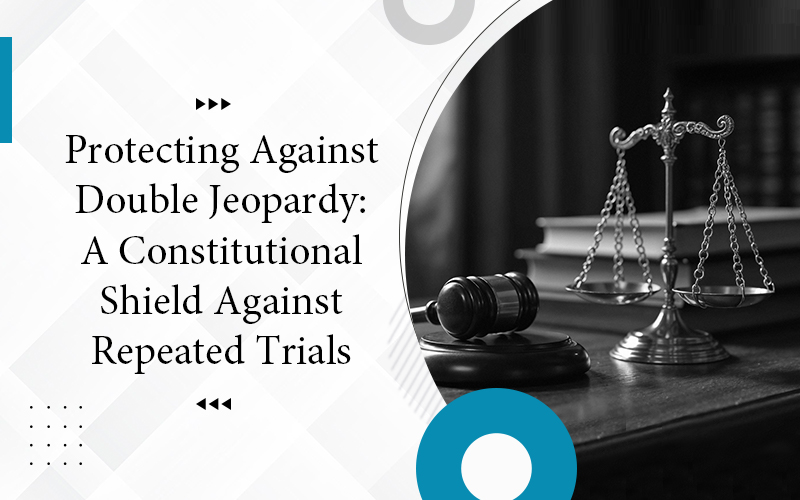The principle of double jeopardy is a fundamental safeguard in criminal jurisprudence, ensuring that no individual is tried or punished more than once for the same offence. This concept, rooted in the maxim “nemo debet bis vexari pro eadem causa” (no one should be vexed twice for the same cause), plays a crucial role in protecting the rights of the accused, maintaining the integrity of judicial processes, and upholding the rule of law.
Constitutional and Legal Framework in India
In India, the protection against double jeopardy is enshrined under Article 20(2) of the Constitution, which states:“No person shall be prosecuted and punished for the same offence more than once.”
This is further reinforced by Section 300 of the Code of Criminal Procedure, 1973 (CrPC), which bars a second trial for the same offence once a person has been tried and either convicted or acquitted by a competent court. It ensures that once the judicial process has culminated in a verdict, the individual is shielded from further prosecution on the same facts.
Scope and Application
To invoke the protection of double jeopardy, three essential elements must be satisfied:
- Same Offence: The subsequent prosecution must be for the same offence. If the charges are different but arise from the same act or transaction, courts examine whether the offences are substantially the same.
- Prosecution and Punishment: The person must have been prosecuted and punished or acquitted earlier. A mere investigation or arrest does not trigger the protection.
- Trial by a Competent Court: The earlier trial must have been conducted by a court of competent jurisdiction and must have reached a conclusion (conviction or acquittal).
Judicial Interpretation
Indian courts have clarified and reinforced the doctrine of double jeopardy through various rulings:
- In Maqbool Hussain v. State of Bombay (1953), the Supreme Court held that proceedings before a customs authority did not amount to prosecution before a court and hence did not attract Article 20(2).
- In S.A. Venkataraman v. Union of India (1954), it was observed that departmental inquiries or administrative proceedings do not constitute prosecution under the criminal law, and therefore, double jeopardy does not apply.
- In Kolla Veera Raghav Rao v. Gorantla Venkateswara Rao (2011), the Court ruled that a person convicted under a minor offence cannot be prosecuted again for a major offence based on the same facts.
Exceptions and Limitations
Despite its strong protective intent, the double jeopardy rule has limitations:
- Fresh charges for distinct offences: If the same act leads to different legal consequences under distinct statutes (e.g., under IPC and a special law), a fresh trial may be permissible.
- Civil or administrative action: Disciplinary or civil proceedings following a criminal case do not violate double jeopardy, as they are treated as separate.
- Appeals and retrials: Retrial after a conviction is set aside on appeal due to procedural irregularity does not violate double jeopardy.
Comparative Perspective
The principle of double jeopardy is universally recognised in democratic legal systems. The Fifth Amendment to the U.S. Constitution contains a similar guarantee. In the UK, while common law recognises the principle, the Criminal Justice Act, 2003 allows retrial in certain serious cases if fresh and compelling evidence emerges. This shows a global trend toward balancing individual rights with the interest of justice.
Conclusion
The protection against double jeopardy is an essential component of a fair criminal justice system. It ensures finality in legal proceedings, prevents harassment of the accused, and promotes public confidence in the judicial process. While exceptions exist to serve the ends of justice, courts must carefully navigate these boundaries to avoid misuse or dilution of this vital constitutional guarantee. In safeguarding against repeated trials, the principle acts as a guardian of liberty and a deterrent against state overreach.




